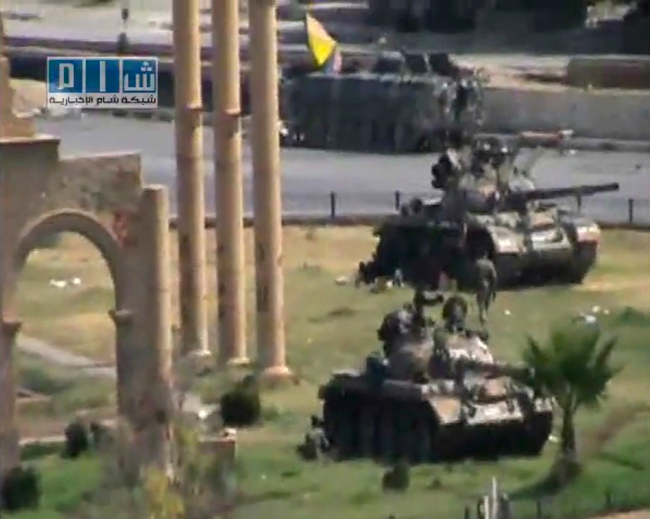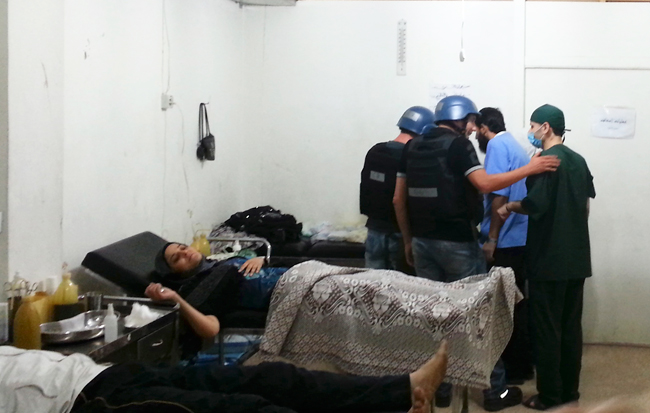The war in Syria: A brief timeline
America is on the brink of taking military action in Syria. How did we get here?

A free daily email with the biggest news stories of the day – and the best features from TheWeek.com
You are now subscribed
Your newsletter sign-up was successful
The United States appears poised to launch missile strikes against the regime of Syrian President Bashar al-Assad, which is accused of using chemical weapons to kill hundreds of people near Damascus earlier this month. But this is hardly the beginning of the war. Syria has been consumed by violence for two and a half years. Here, a brief look at how the situation has escalated since 2011.

February 22, 2011
Inspired by the uprisings in Tunisia and Egypt, 15 teenagers write anti-regime graffiti on the walls of Dara, a small town in southern Syria. They are arrested and thrown into prison.
The Week
Escape your echo chamber. Get the facts behind the news, plus analysis from multiple perspectives.

Sign up for The Week's Free Newsletters
From our morning news briefing to a weekly Good News Newsletter, get the best of The Week delivered directly to your inbox.
From our morning news briefing to a weekly Good News Newsletter, get the best of The Week delivered directly to your inbox.
March 25, 2011
Syrian troops fire into a reportedly peaceful demonstration over the teens' February arrests. Several people are killed.
May 18, 2011
The United States imposes sanctions on Syria after a month of violent crackdowns by the Assad regime against protesters. Activists say at least 700 people have been killed.
A free daily email with the biggest news stories of the day – and the best features from TheWeek.com
July 31, 2011
Tanks roll into the central city of Hama, launching an attack before the first day of Ramadan that activists say kills 80 people, bringing back memories of the 1982 massacre of 20,000 people in the same city by Assad's father.
August 18, 2011
"For the sake of the Syrian people, the time has come for President Assad to step aside," says President Barack Obama. The leaders of Britain, France, and Germany join the United States in calling for Assad to resign.
November 12, 2011
The Arab League, which includes Egypt, Saudi Arabia, and 20 other countries, votes to suspend Syria's membership and threatens to impose economic and political sanctions if it doesn't stop the ongoing attacks against protesters.
February 4, 2012
International officials condemn the "massacre" in the city of Homs after an estimated 300 people are killed by a barrage of artillery fire from Syrian government forces. Shortly thereafter, China and Russia veto a resolution by the U.N. Security Council backing an Arab League peace plan for Syria.
August 21, 2012
President Barack Obama says Assad using chemical weapons would be a "red line" that would "change [his] equation" on Syria. Opposition activists put the death toll in the conflict at 20,000.
March 19, 2013
Rebels and the Assad regime accuse each other of using chemical weapons to kill 25 people in the Khan al-Assal region north of Aleppo. The White House announces there will be "consequences" if the Syrian government is guilty of the attack. More than 6,000 people are killed in March alone, activists say, making it the bloodiest month since the conflict began.
April 25, 2013
The White House says, with "varying degrees of confidence," that it believes the Assad regime "used chemical weapons on a small scale" on March 19.
June 13, 2013
The Obama administration announces it will send small arms and ammunition to Syrian rebels. The decision is later debated by Congress over fears that the United States could be arming al Qaeda-linked opposition groups like the Al-Nusra Front.
July 25, 2013
The United Nations announces that 100,000 people have been killed and 1.7 million people have been forced to become refugees as a result of the violence.

August 21, 2013
Opposition forces claim that hundreds of people are killed in a chemical weapons attack in the Damascus suburb of Ghouta, putting pressure on Obama to act on his "red line" comment. The Syrian government denies using chemical weapons.
August 26, 2013
Secretary of State John Kerry says there is enough evidence to "strongly indicate" that the Syrian government had used chemical weapons in Ghouta, calling the attack a "moral obscenity."
Sources: Associated Press, BBC (2), CBC, CBS News, CNN, The Guardian (2)(3), The New York Times (2)(3)(4), Reuters (2)(3)(4)
Keith Wagstaff is a staff writer at TheWeek.com covering politics and current events. He has previously written for such publications as TIME, Details, VICE, and the Village Voice.
-
 The environmental cost of GLP-1s
The environmental cost of GLP-1sThe explainer Producing the drugs is a dirty process
-
 Greenland’s capital becomes ground zero for the country’s diplomatic straits
Greenland’s capital becomes ground zero for the country’s diplomatic straitsIN THE SPOTLIGHT A flurry of new consular activity in Nuuk shows how important Greenland has become to Europeans’ anxiety about American imperialism
-
 ‘This is something that happens all too often’
‘This is something that happens all too often’Instant Opinion Opinion, comment and editorials of the day